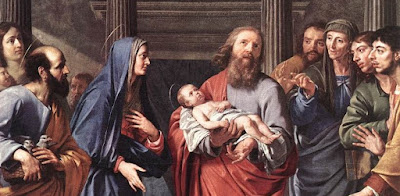This hymn by James Montgomery is probably most often sung at Christmas, but in fact it encompasses these whole forty days, moving on to Epiphany in stanza three and this feast day in stanza four. I must admit that I had sung this hymn for many years before realizing that the saints mentioned in the last stanza were actually Anna and Simeon.
Angels from the realms of glory,
Wing your flight o’er all the earth;
Ye who sang creation’s story
Now proclaim Messiah’s birth.
Refrain
Come and worship, come and worship,
Worship Christ, the newborn King.
Shepherds, in the field abiding,
Watching o’er your flocks by night,
God with us is now residing;
Yonder shines the infant Light:
Refrain
Sages, leave your contemplations,
Brighter visions beam afar;
Seek the great Desire of nations;
Ye have seen his natal star.
Refrain
Saints, before the altar bending,
Watching long in hope and fear;
Suddenly the Christ, descending,
In the temple shall appear.
Refrain
James Montgomery, 1816; alt.
Tune: REGENT SQUARE (8.7.8.7.8.7.)
Henry T. Smart, 1867
REGENT SQUARE is probably the most well-known tune by Victorian composer Henry Smart (though LANCASHIRE would be a close second). In the course of writing this blog I have discovered that I like several other tunes by Smart which are no longer sung often, and have presented some of them here on the site (click Smart's tag below).
P.S. - The illustration above is detail from The Presentation in the Temple by Philippe de Champaigne (1648) done for the high altar of the Church of Saint-Honore in Paris.
Eight Years Ago: O Zion, open wide thy gates
Seven Years Ago: Hail to the Lord who comes
Six Years Ago: O Jerusalem beloved (now on Facebook)
Five Years Ago: In peace and joy I now depart
Three Years Ago: In the temple now behold him
Two Years Ago: Joy! joy! the Mother comes






